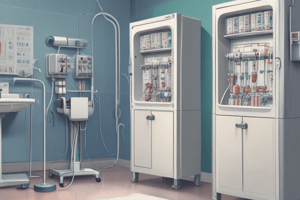Podcast
Questions and Answers
What is the purpose of an arteriovenous fistula in the context of hemodialysis?
What is the purpose of an arteriovenous fistula in the context of hemodialysis?
- To mimic the functions of a healthy kidney
- To filter waste products from the blood
- To prevent complications in kidney failure patients
- To establish a connection between an artery and vein for optimal blood flow (correct)
Why is the fistula maturation period after surgery important?
Why is the fistula maturation period after surgery important?
- To reduce the risk of clotting and infection (correct)
- To speed up the recovery time
- To prevent kidney failure complications
- To avoid dialyzer malfunction
What is the primary function of hemodialysis?
What is the primary function of hemodialysis?
- To regulate blood pressure only
- To maintain a stable internal environment (correct)
- To boost the immune system
- To mimic the functions of the liver
Why are arteriovenous fistulas preferred for hemodialysis?
Why are arteriovenous fistulas preferred for hemodialysis?
What happens during hemodialysis?
What happens during hemodialysis?
How long does it typically take for an arteriovenous fistula to mature for hemodialysis treatment?
How long does it typically take for an arteriovenous fistula to mature for hemodialysis treatment?
What is the average time for an AV fistula to fully mature?
What is the average time for an AV fistula to fully mature?
Which of the following is NOT a symptom of a matured fistula?
Which of the following is NOT a symptom of a matured fistula?
What is an important step in caring for a matured fistula to encourage blood flow?
What is an important step in caring for a matured fistula to encourage blood flow?
Why is it crucial for patients to avoid activities like heavy lifting after fistula maturation?
Why is it crucial for patients to avoid activities like heavy lifting after fistula maturation?
What should patients do if they notice a decrease in the 'thrill' sensation of their matured fistula?
What should patients do if they notice a decrease in the 'thrill' sensation of their matured fistula?
Why is fistula maturation time important in hemodialysis treatment?
Why is fistula maturation time important in hemodialysis treatment?
Flashcards are hidden until you start studying
Study Notes
Fistula Maturation Time
An arteriovenous fistula is a surgical connection between an artery and vein intended to allow blood flow from an artery into a vein within the body. This type of artificial access can help patients with chronic kidney disease receive dialysis treatment without the need for frequent venipuncture procedures. However, after surgery, there is a period known as fistula maturation when it typically takes four to six weeks for the connection to establish itself sufficiently to handle regular hemodialysis treatments. While this waiting period may seem daunting, understanding the process behind it can better equip patients for their care journey during and after surgery.
What Is Hemodialysis?
Hemodialysis is a lifeline for patients with kidney failure, allowing them to maintain a stable internal environment and prevent complications. The process involves the use of a dialyzer, which filters the blood, removing waste products, excess salt, and water. The goal of hemodialysis is to mimic the functions of a healthy kidney.
The Role of Arteriovenous Fistulas in Hemodialysis
Arteriovenous (AV) fistulas are the preferred method of vascular access for hemodialysis, as they provide better blood flow and have a lower risk of infection and clotting. The fistula maturation process is crucial because it ensures that the connection between the artery and vein is strong enough to handle the high blood flow rates required for hemodialysis treatment.
Fistula Maturation Time and Process
The maturation time for an AV fistula varies widely depending on factors such as the patient's overall health, the quality of the surgical procedure, and the patient's ability to maintain the fistula during the healing process. On average, it takes about 3-6 weeks for the fistula to fully mature, but in some cases, it can take up to 12 weeks. During this time, the patient must avoid any activities that could damage the fistula, such as heavy lifting or strenuous exercise.
Symptoms of a Matured Fistula
A matured fistula exhibits three key characteristics:
- A "thrill" or "buzz" can be felt when the hand is washed or touched with a cold substance.
- A palpable cord or feeling of a cord in the forearm.
- A "flash" or "flashback" of blood with a small amount of pressure, like a small droplet of water, when the hand is held above the heart.
Care and Management of a Matured Fistula
Once a fistula is matured, it is essential to take good care of it to maintain its accessibility for hemodialysis treatment. This includes:
- Gently massaging the fistula to encourage blood flow.
- Avoiding any activities that could lead to injury, such as heavy lifting or strenuous exercise.
- Keeping the fistula warm, especially during cold weather.
- Informing healthcare providers of any changes or issues, such as a decrease in thrill or palpable cord.
Conclusion
Fistula maturation time is a crucial part of the hemodialysis process. It ensures that the connection between the artery and vein is strong enough to handle the high blood flow rates required for hemodialysis treatment. By understanding the process and taking proper care of the fistula, patients can maintain their accessibility for hemodialysis treatment and improve their quality of life.
Studying That Suits You
Use AI to generate personalized quizzes and flashcards to suit your learning preferences.




